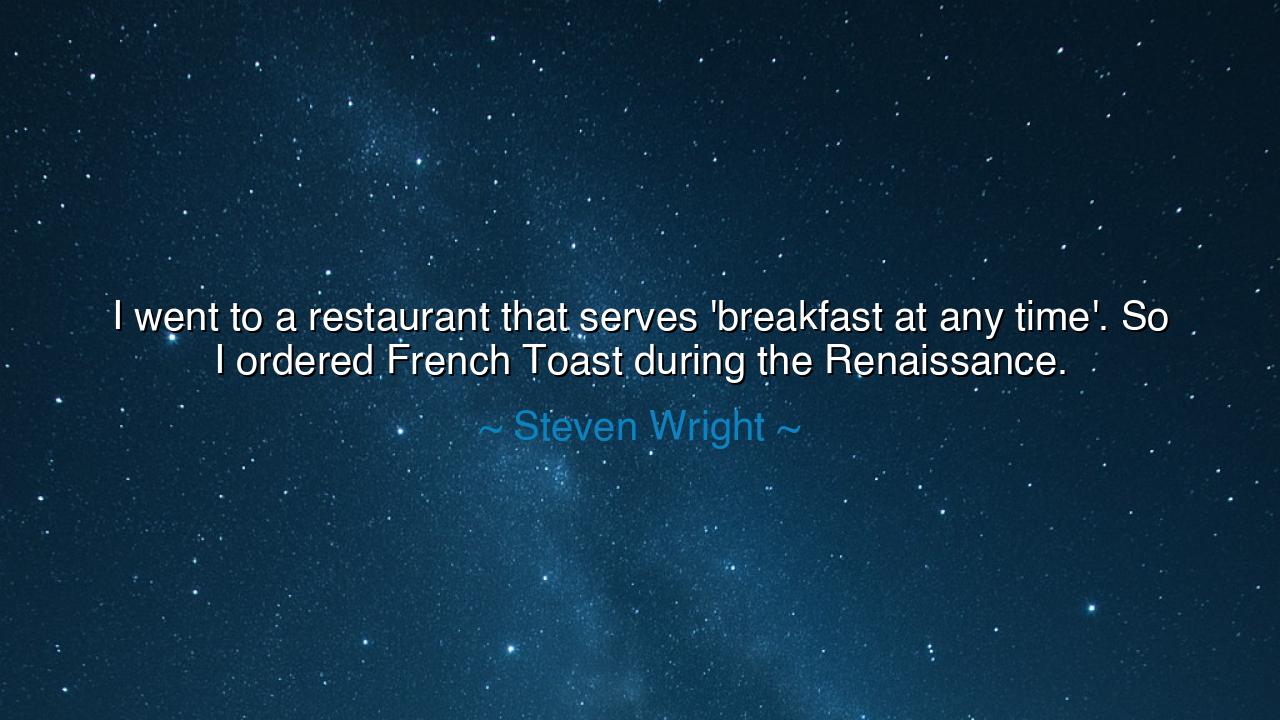
I went to a restaurant that serves 'breakfast at any time'. So I
I went to a restaurant that serves 'breakfast at any time'. So I ordered French Toast during the Renaissance.






Hear now the whimsical yet profound utterance of Steven Wright: “I went to a restaurant that serves ‘breakfast at any time’. So I ordered French Toast during the Renaissance.” Though spoken as jest, clothed in the garments of humor, it contains within it a wisdom older than kings and deeper than oceans. For what is this but a meditation on the absurdity of time, and man’s longing to bend it to his will? To eat the bread of dawn in an age long past is impossible, yet the imagination dares to command it. Wright, through humor, uncovers our eternal struggle with the boundaries of reality.
The origin of this thought lies in the comic genius of Wright, a master of irony who spoke truths through paradox. By playing with the phrase “breakfast at any time,” he shattered the simple meaning of a restaurant menu and stretched it to cosmic proportions. Time, in his jest, becomes not the unyielding river of Marcus Aurelius, nor the dimension of Einstein, but a plaything of imagination. He reminds us that our minds, unlike our bodies, are not chained to the present moment. Through laughter, he frees us from the tyranny of the clock.
Consider, O listeners, how humanity has always dreamed of this same freedom. From the legends of time-traveling gods to the great scientific works of H. G. Wells, the desire to leap across eras has burned in the hearts of mortals. Wright’s joke, light as air, joins this eternal quest, for to order French Toast during the Renaissance is to declare: “Why should I be bound by centuries, when my mind can leap them in an instant?” His jest is a torch of imagination, proving that humor can carry the same weight as philosophy.
And yet, beneath the laughter lies a warning. For how often do men live not in the present, but in fantasies of other ages—dreaming of past golden eras or futures yet to come, while neglecting the bread before them? Just as it is absurd to demand a Renaissance meal in a modern café, so it is folly to demand that our lives exist anywhere but in the moment we are given. Wright, through his irony, teaches us that while the imagination may roam freely, our true nourishment must be taken in the now.
History itself echoes this truth. Leonardo da Vinci dreamed of machines that could fly centuries before they were built. His visions, though rooted in the Renaissance, seemed absurd to his peers, like ordering breakfast at an impossible hour. Yet his imagination sowed seeds that blossomed centuries later. Thus, while the joke mocks impossibility, it also honors the human spirit, which dares to think beyond its age. The impossible today may feed generations tomorrow.
The meaning of Wright’s jest, then, is twofold: it celebrates the boundless freedom of the mind, yet it also highlights the absurdity of ignoring reality. To live fully, we must balance both—embracing the imagination that lets us wander through time, while grounding ourselves in the present, where action and meaning dwell. For imagination alone is hunger without bread, but action without imagination is bread without taste.
The lesson for us is clear: laugh at the absurdities of life, but also learn from them. Do not waste your days longing for other ages, nor limit your soul to what the clock dictates. Use humor as a key to unlock imagination, and use imagination as a tool to shape your present. In doing so, you will live not only wisely but joyfully, tasting the fullness of existence in every moment.
So let Wright’s playful wisdom echo as ancient counsel in modern form: “I went to a restaurant that serves ‘breakfast at any time’. So I ordered French Toast during the Renaissance.” Remember it when you are tempted to flee into the past or wait for the future. Let it remind you that the imagination can leap through centuries, but life is lived here, now, in the moment before you. Embrace both the laughter of the mind and the bread of the present, and you shall be nourished in both body and soul.






AAdministratorAdministrator
Welcome, honored guests. Please leave a comment, we will respond soon